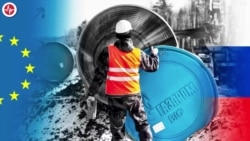On July 20, Russian President Vladimir Putin accused Canada of sabotaging Gazprom’s ability to supply Europe with gas.
Putin speculated that Canada wants to sell its own gas and oil to Europe, and implied that Western economic sanctions imposed because of the Kremlin’s war on Ukraine hindered Gazprom, the state-controlled Russian energy behemoth.
At the Agency for Strategic Initiatives forum in Moscow, Putin spoke about a turbine being repaired in Canada. Such turbines are used to push natural gas through pipelines for delivery.
Putin said: “One machine needs planned repairs; it is not given back from Canada because sanctions have been placed against Gazprom, although it is a Siemens (a German company) plant.
“I'll tell you why Canada did it: because it produces oil and gas itself and plans to enter the European market."
The claim is false. Canada did send the repaired turbine back to Germany, and had earlier exempted Gazprom’s partner, Siemens Energy, from sanctions for two years.
U.S. and European officials have accused Russia of using energy as a weapon in its war against Ukraine. Before its February invasion of Ukraine, Russia supplied about 40 percent of Europe’s natural gas. EU officials have asked member countries to reduce usage 15 percent and fear that Russia, which has already reduced flows, will cut the gas off entirely.
Enter the turbine controversy, which involves the Nord Stream 1 pipeline in the North Sea through which Russia’s gas flows.
On July 13, The Globe and Mail news agency reported, citing state officials, that Canada granted Siemens Energy a two-year exemption from sanctions the country imposed over the war in Ukraine.
The exemption was to allow Siemens to repair six Nord Stream 1 turbines at the company’s facility in Montreal and to return them to Russia, the Globe and Mail reported.
Canada had announced on July 11 that it would be returning one repaired turbine to Germany. The United States stated its support of Canada’s decision in a same-day statement.
“[W]e support the Canadian government’s decision to return a natural gas turbine to Germany for use in the Nord Stream 1 pipeline,” U.S State Department spokesman Ned Price said.
“In the short term, the turbine will allow Germany and other European countries to replenish their gas reserves, increasing their energy security and resiliency and countering Russia’s efforts to weaponize energy.”
Still, Ukrainian President Volodymyr Zelenskyy had criticized the Canadian exemption as “absolutely unacceptable.”
“Russia deliberately does this blackmailing with gas and provoking violations of sanctions,” he said in a July 17 video.
CNN Business and other news agencies reported on July 21 that Gazprom had resumed gas shipments through Nord Stream 1.
Given Europe’s dependence on Russian gas and oil, Gazprom has not been targeted directly in the United States-European Union sanctions for the war. Under Directives 3 and 4, the U.S. restrictions are limited to Gazprom’s financial operations with certain Russian banks, which are under sanctions.
Moreover, Gazprom owns its own bank, the third-largest in Russia, which also avoided sanctions. The Radio Free Europe/Radio Liberty’s Ukrainian team Schemes reported in July that the Russian military uses Gazprombank to pay salary and combat wages to troops deployed to the war in Ukraine.
(RFE/RL is a U.S. funded sister news organization to VOA.)
In his July 20 remarks, Putin expressed doubt about the quality of repairs to the turbine and suggested that Canada might intentionally sabotage Nord Steam 1. “Maybe they will turn it off at some point, and that’s it, and Nord Stream 1 will stop, because they came from there, from Canada,” Putin said.
On June 14, Gazprom informed Germany that it will be reducing gas supplies via Nord Stream 1 from planned 167 million to 100 million cubic meters a day. The next day, Gazprom reduced the volume of gas to 67 million cubic meters, citing delay in returning the repaired turbine from Canada.
Since early 2021, Russia has been gradually reducing natural gas supplies to Europe, causing prices to surge. Prices have more than doubled from their pre-invasion levels in February.






